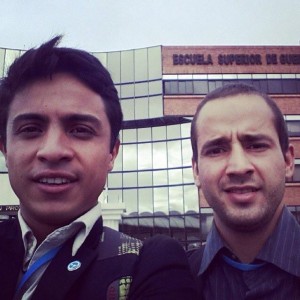Deportation of Venezuelan Students Is Cowering to Tyrants
Last week, the Colombian government continued with its surprising obedience to the oppressive Venezuelan regime. The Juan Manuel Santos administration deported two Venezuelan students back to their home country. First came the expulsion of Lorent Gómez Saleh on September 4, followed by Gabriel Valles the next day.

Colombian officials deported Venezuelan students Luis Gómez Saleh and Gabriel Valles. (@Olibertad)
Perhaps the most nonsensical aspect of the Venezuelan legal apparatus is the resources spent to chase “criminal” political activists, while the country is overrun by real crime: murder, robbery, and drug trafficking.
The regime created by Hugo Chávez and furthered along by Nicolás Maduro is well known, and its failures are well documented. Their repressive actions against their own people are no longer surprising, whether it’s counterproductive economic policies, or the concentration of state power in the hands of a dictator.
The current attitude of the Colombian government, however, is of much graver concern. Colombia has traditionally been a country with a strong democratic foundation, even if it is perpetually threatened. It’s democratic strength, in fact, was shown most recently in response to the administration of former President Álvaro Uribe Vélez (2002-2010).
Colombia has traditionally been a country with a strong democratic foundation, even if it is perpetually threatened.Uribe was a populist character who tried to break the rules to remain in power. However, unlike authoritarian rulers in Ecuador, Bolivia, and Venezuela, Uribe was unable to do it.
His ambitions were thwarted by the Colombian Constitutional Court, a watershed moment for Colombian democracy, and a testament to a healthy system of checks and balances. The former president’s response to the ruling was no less democratic. Uribe willingly accepted the decision without jeopardizing the stability of his country.
The above example demonstrates how Colombia has historically acted to defend democracy, a shining light amid a sea of authoritarianism. However, recent moves by President Juan Manuel Santos have put Colombian democracy in grave peril. Personal enemies or opponents of the president that could potentially be considered a threat are now faced with charges, indictments, or accusations of criminality.
Along these same lines, the decision to deport the two young Venezuelans appears to have been drawn from these same motivations. The Colombian Foreign Ministry argued that the pair represented a threat to national security. The Colombian media alleged that Saleh and Valles were connected to neo-Nazi groups. They were also accused of campaigning against Santos in the most recent election, which foreigners are prohibited from doing in the country.
While these deportations received a fair amount of media attention, nothing was ever presented to a judge.
Do foreigners not have a right to defend themselves? Do neo-Nazi affiliations, while absurd and contemptible, mean immediate expulsion from a supposedly free and democratic country?
Should the government not first establish the existence of a real threat based on objective criteria? Should these young men have been delivered to a dictatorial regime, to which they are openly opposed, based on their beliefs?
The questions are many, and the answers are few.
The reality is that the recent abuse of diplomatic and governmental mechanisms to remove these individuals from the country is contradictory to Colombian democracy. Invoking national security and bypassing the justice system has now surely condemned these two human beings to years in jail for committing the only crime that is punished in Venezuela any more: being enemies of 21st-century socialism.
Disguised beneath a seemingly conciliatory and peaceful discourse, the current government is using its executive powers and judicial influence to silence political opposition in the country.The administration of Juan Manuel Santos has to this point shown different faces. Since beginning his second term, Santos has begun a “progressive” evolution, which will undoubtedly lead to greater state intervention in the economy.
Disguised beneath a seemingly conciliatory and peaceful discourse, the current government is using its executive powers and judicial influence to silence political opposition in the country. We are increasingly confronted with a vengeful government that pursues the personal enemies of the state at the expense of our free society. While the government talks of peace, it simultaneously threatens our democracy, societal organizations, and institutions that have made Colombia an anomaly in the region.
The Santos government is becoming a dangerous wolf in sheep’s clothing, and the urgency to save what is left of our democracy grows every day.
No comments:
Post a Comment